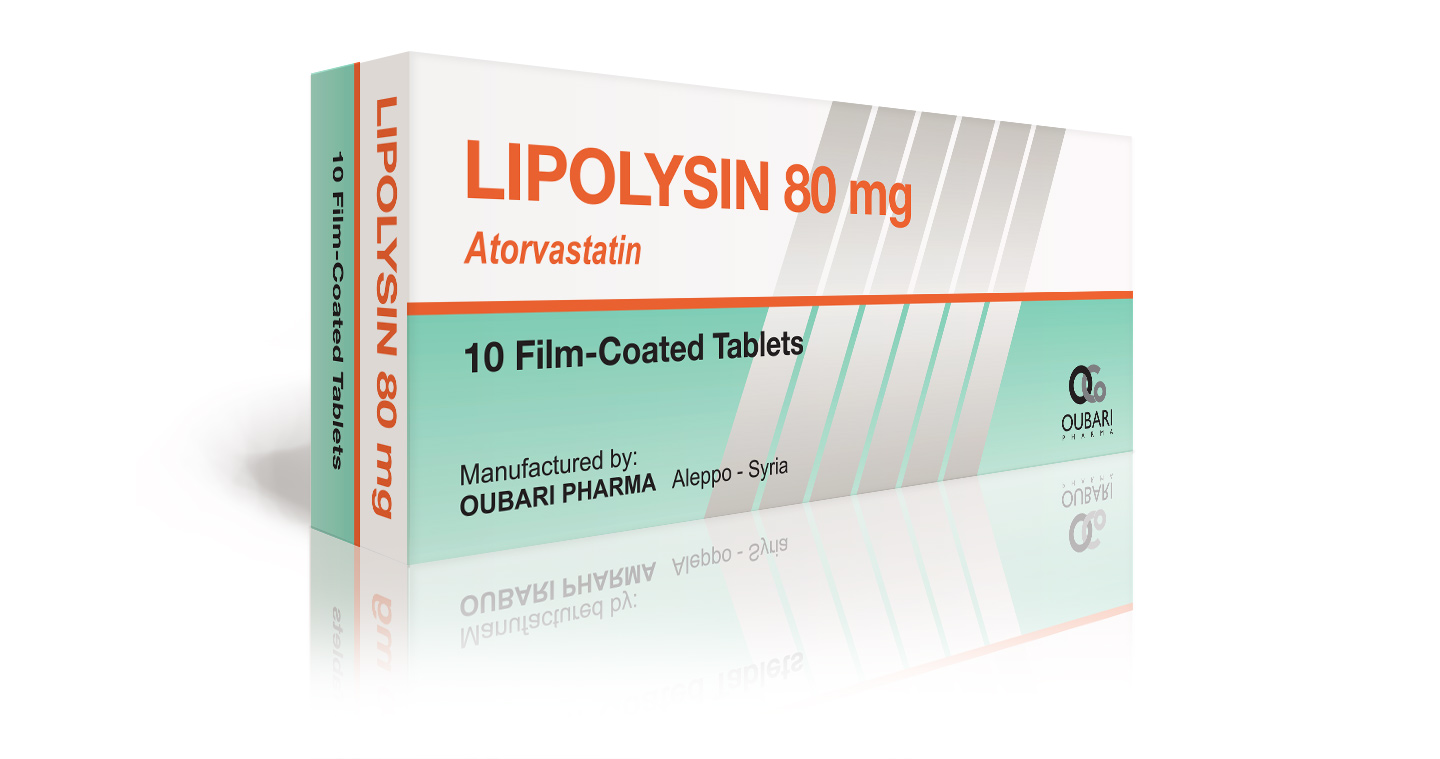Generic Name: Atorvastatin
Dosage Form: Tablets
License: Generic
Category: Cholesterol & Triglycerides Lowering Agent
Packaging: 10 Tablets x 1 Blister
More Info

Generic Name: Atorvastatin
Dosage Form: Tablets
License: Generic
Category: Cholesterol & Triglycerides Lowering Agent
Packaging: 10 Tablets x 1 Blister
*Packaging design and product name may be different in your country.
Each Lipolysin 80 mg film-coated tablet contains:
In adult patients without clinically evident coronary heart disease, but with multiple risk factors for coronary heart disease such as age ≥ 55 years, smoking, hypertension, low HDL-C, or a family history of early coronary heart disease, Lipolysin is indicated to:
In patients with type 2 diabetes, and without clinically evident coronary heart disease, but with multiple risk factors for coronary heart disease such as retinopathy, albuminuria, smoking, or hypertension, Lipolysin is indicated to:
In patients with clinically evident coronary heart disease, Lipolysin is indicated to:
Lipolysin is indicated:
Therapy with lipid-altering agents should be a component of multiple-risk-factor intervention in individual at increased risk for atherosclerotic vascular disease due to hypercholesterolemia.
After the LDL-C goal has been achieved, if the triglycerides are still ≥ 200 mg/dL, non-HDL-C (total-C minus HDL-C) becomes a secondary target of therapy. Non-HDL-C goals are set 30 mg/dL higher than LDL-C goals for each risk category.
For patients with triglycerides (TG) < 400 mg/dL, LDL-C can be estimated using the following equation: LDL-C = (total-C) – (0.20 X [TG] + HDL-C). For TG levels > 400 mg/dL, this equation is less accurate and LDL-C concentrations should be determined by ultracentrifugation.
Atorvastatin has not been studied in conditions where the major lipoprotein abnormality is elevation of chylomicrons (Fredrickson Types I and V).
The classification of cholesterol levels in pediatric patients with a familial history of hypercholesterolemia or premature cardiovascular disease is summarized below:
| Category | Total-C (mg/dL) | LDL-C mg/dL |
| Acceptable | < 170 | < 110 |
| Border Line | 170 – 199 | 110 – 129 |
| High | ≥ 200 | ≥ 130 |
A standard cholesterol-lowering diet should be performed by the patient before receiving Lipolysin, and should continue on this diet during treatment with Lipolysin.
The recommended starting dose is 10 or 20 mg once daily. Patients who require a large reduction in LDL-C (more than 45%) may be started at 40 mg once daily, the dosage range is 10 to 80 mg once daily. Lipolysin can be administered as a single dose at any time of the day, with or without food. After initiation and / or upon titration of Lipolysin, lipid levels should be analyzed within 2 to 4 weeks and dosage adjusted accordingly since the goal of the treatment is to lower LDL-C, the LDL-C levels are used now to initiate and assess treatment response. Only if LDL-C levels are not available, should total-C be used to monitor therapy.
The recommended starting dose of Lipolysin is 10 mg/day; the maximum recommended dose is 20 mg / day (doses greater than 20 mg have not been studied in this patient population). Doses should be individualized according to the recommended goal of therapy. Adjustments should be made at intervals of 4 weeks or more.
The dosage of Lipolysin in patients with homozygous FH is 10 mg to 80 mg daily.
Lipolysin should be used as an adjunct to other lipid-lowering treatments (e.g., LDL apheresis) in these patients or if such treatments are unavailable.
Atorvastatin may be used in combination with a bile acid binding resin for additive effect. The combination of HMG-CoA reductase inhibitors and fibrates should generally be avoided.
Renal disease does not affect the plasma concentrations nor LDL-C reduction of Atorvastatin; thus, dosage adjustment in patients with renal dysfunction is not necessary.
In patients taking cyclosporine, therapy should be limited to Lipolysin – 10 mg once daily. In patients taking clarithromycin, itraconazole, or in patients with HIV taking a combination of ritonavir plus saquinavir or lopinavir plus ritonavir, for doses of Lipolysin exceeding 20 mg, appropriate clinical assessment is recommended to ensure that the lowest dose necessary of Lipolysin is employed.
*The information provided above is general in nature and for informational purposes only. It is NOT a substitute for the advice of your doctor. You must always consult your healthcare professional before starting any medication/supplementation program.